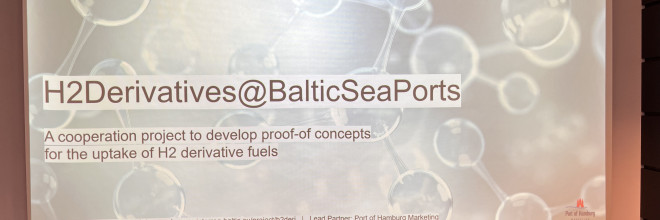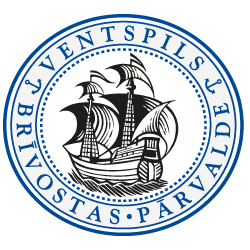
To make shipping more environmentally friendly, the European Union is developing projects that promote the use of alternative fuels. The H2Derivatives@BSP cooperation project of seven European countries is one of those that is expected to play a dominant role in this process. Its goal is to design hydrogen alternative fuel infrastructure in the ports of the Baltic Sea. The Freeport of Ventspils Authority is one of the leading partners in the project and will be accountable for developing a technical and business model for producing and using renewable energy and alternative fuels in ports.
The H2Derivatives@BSP project will conduct market research, develop investment plans for production capacity expansion, and enhance green fuel processing technologies at the port. It will also establish safety standards for bunkering to facilitate the use of hydrogen and its derivatives (e-methanol, ammonia) as alternative fuels in shipping. These efforts aim to reduce maritime transport emissions in line with the EU FuelEU Maritime regulation, which targets an 80% reduction in ship fuel emissions by 2050.
The Freeport of Ventspils Authority will lead the development of a planning and optimization model, creating investment and development scenarios for hydrogen and sustainable fuel production based on local renewable energy resources.
The project will span three years: the first year will focus on market research and solution development, the second on technology and solution trials, and the third on implementation and dissemination.
The first project partners’ meeting took place in Hamburg in early March, bringing together leading port and alternative fuels experts from the Baltic Sea region. During the meeting, participants discussed the project's main objectives, work plan, and key activities, including improving alternative fuel infrastructure in ports and establishing green energy supply chains. Kaspars Liepiņš, developer of the Renewable Energy Cluster, represented the Freeport of Ventspils Authority at the event.
The project is part of the Interreg Baltic Sea Region programme and is coordinated by the experienced consultancy Hamburg Port Consulting. It involves business support organizations, energy producers and suppliers, shipping lines, and higher education and research institutions from Denmark, Germany, Finland, Sweden, Estonia, Lithuania, and Latvia. The project also strengthens cooperation with other Baltic and North Sea ports already working on hydrogen infrastructure and export/import chain development. Ventspils Port, as a key infrastructure hub, has significant potential to contribute to the hydrogen economy and become a center for alternative fuel production and export. This initiative will further establish Ventspils as a leader in sustainable energy solutions, supporting its transition from a fossil fuel port to a renewable energy hub.

